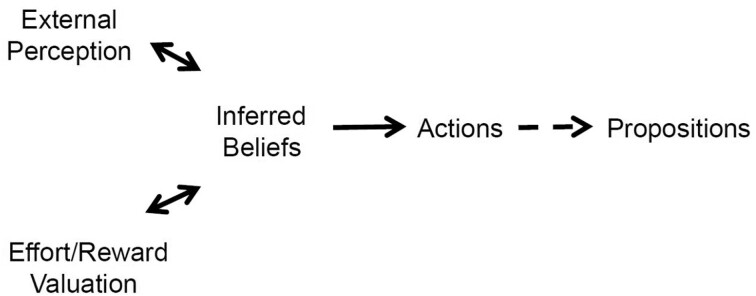{"title":"信仰使它成为科学:信不信由你。","authors":"Rüdiger J Seitz, Raymond F Paloutzian","doi":"10.1093/function/zqad049","DOIUrl":null,"url":null,"abstract":"© t n c long-standing discourse in philosophy dating back to antiqity concerns the nature of beliefs and believing. Until today, he notion “belief” has been of importance in philosophy, as evient from the definition of knowledge as justified true belief. In act, the notion “belief” was understood as a topic of resear c h ocused on people’s attitudes or opinions about what was or was ot true in the w orld. 1 Resear c h questions were summarized by he formula “ S A that P ,” where S denotes the mental state, A he attitude of a putati v el y rational a gent, and P the v erball y xpr essed pr oposition r eflecting the belief. 1 By contrast, the tudy of beliefs was generally assumed to be incompatible with he natural sciences. Ver y r ecentl y, howev er, the term “belief” as been described as to be used widespread in the cogniti v e cience literature to explain human reasoning and behavior. 2 pecifically, it has been described that beliefs act as fundamenal hypotheses about the world that result from any amount of ogniti v e pr ocessing and ar e held with any degr ee of certainty. 3 hus, beliefs are apparently not propositions expressed by conciousl y aw ar e , so-called r ational agents, but, on the contrary, eterminants of people’s spontaneous and intuiti v e behavior in complex world, as highlighted in a recent interdisciplinary esear c h topic. 4 Here , w e put the implications of the recent dvancements in this rapidly evolving field in perspective for the ciences and beyond.","PeriodicalId":73119,"journal":{"name":"Function (Oxford, England)","volume":"4 6","pages":"zqad049"},"PeriodicalIF":3.8000,"publicationDate":"2023-09-02","publicationTypes":"Journal Article","fieldsOfStudy":null,"isOpenAccess":false,"openAccessPdf":"https://ftp.ncbi.nlm.nih.gov/pub/pmc/oa_pdf/6f/e5/zqad049.PMC10519273.pdf","citationCount":"0","resultStr":"{\"title\":\"Beliefs Made It into Science: Believe It or Not.\",\"authors\":\"Rüdiger J Seitz, Raymond F Paloutzian\",\"doi\":\"10.1093/function/zqad049\",\"DOIUrl\":null,\"url\":null,\"abstract\":\"© t n c long-standing discourse in philosophy dating back to antiqity concerns the nature of beliefs and believing. Until today, he notion “belief” has been of importance in philosophy, as evient from the definition of knowledge as justified true belief. In act, the notion “belief” was understood as a topic of resear c h ocused on people’s attitudes or opinions about what was or was ot true in the w orld. 1 Resear c h questions were summarized by he formula “ S A that P ,” where S denotes the mental state, A he attitude of a putati v el y rational a gent, and P the v erball y xpr essed pr oposition r eflecting the belief. 1 By contrast, the tudy of beliefs was generally assumed to be incompatible with he natural sciences. Ver y r ecentl y, howev er, the term “belief” as been described as to be used widespread in the cogniti v e cience literature to explain human reasoning and behavior. 2 pecifically, it has been described that beliefs act as fundamenal hypotheses about the world that result from any amount of ogniti v e pr ocessing and ar e held with any degr ee of certainty. 3 hus, beliefs are apparently not propositions expressed by conciousl y aw ar e , so-called r ational agents, but, on the contrary, eterminants of people’s spontaneous and intuiti v e behavior in complex world, as highlighted in a recent interdisciplinary esear c h topic. 4 Here , w e put the implications of the recent dvancements in this rapidly evolving field in perspective for the ciences and beyond.\",\"PeriodicalId\":73119,\"journal\":{\"name\":\"Function (Oxford, England)\",\"volume\":\"4 6\",\"pages\":\"zqad049\"},\"PeriodicalIF\":3.8000,\"publicationDate\":\"2023-09-02\",\"publicationTypes\":\"Journal Article\",\"fieldsOfStudy\":null,\"isOpenAccess\":false,\"openAccessPdf\":\"https://ftp.ncbi.nlm.nih.gov/pub/pmc/oa_pdf/6f/e5/zqad049.PMC10519273.pdf\",\"citationCount\":\"0\",\"resultStr\":null,\"platform\":\"Semanticscholar\",\"paperid\":null,\"PeriodicalName\":\"Function (Oxford, England)\",\"FirstCategoryId\":\"1085\",\"ListUrlMain\":\"https://doi.org/10.1093/function/zqad049\",\"RegionNum\":0,\"RegionCategory\":null,\"ArticlePicture\":[],\"TitleCN\":null,\"AbstractTextCN\":null,\"PMCID\":null,\"EPubDate\":\"2023/1/1 0:00:00\",\"PubModel\":\"eCollection\",\"JCR\":\"Q2\",\"JCRName\":\"CELL BIOLOGY\",\"Score\":null,\"Total\":0}","platform":"Semanticscholar","paperid":null,"PeriodicalName":"Function (Oxford, England)","FirstCategoryId":"1085","ListUrlMain":"https://doi.org/10.1093/function/zqad049","RegionNum":0,"RegionCategory":null,"ArticlePicture":[],"TitleCN":null,"AbstractTextCN":null,"PMCID":null,"EPubDate":"2023/1/1 0:00:00","PubModel":"eCollection","JCR":"Q2","JCRName":"CELL BIOLOGY","Score":null,"Total":0}
引用次数: 0
Beliefs Made It into Science: Believe It or Not.
© t n c long-standing discourse in philosophy dating back to antiqity concerns the nature of beliefs and believing. Until today, he notion “belief” has been of importance in philosophy, as evient from the definition of knowledge as justified true belief. In act, the notion “belief” was understood as a topic of resear c h ocused on people’s attitudes or opinions about what was or was ot true in the w orld. 1 Resear c h questions were summarized by he formula “ S A that P ,” where S denotes the mental state, A he attitude of a putati v el y rational a gent, and P the v erball y xpr essed pr oposition r eflecting the belief. 1 By contrast, the tudy of beliefs was generally assumed to be incompatible with he natural sciences. Ver y r ecentl y, howev er, the term “belief” as been described as to be used widespread in the cogniti v e cience literature to explain human reasoning and behavior. 2 pecifically, it has been described that beliefs act as fundamenal hypotheses about the world that result from any amount of ogniti v e pr ocessing and ar e held with any degr ee of certainty. 3 hus, beliefs are apparently not propositions expressed by conciousl y aw ar e , so-called r ational agents, but, on the contrary, eterminants of people’s spontaneous and intuiti v e behavior in complex world, as highlighted in a recent interdisciplinary esear c h topic. 4 Here , w e put the implications of the recent dvancements in this rapidly evolving field in perspective for the ciences and beyond.




 求助内容:
求助内容: 应助结果提醒方式:
应助结果提醒方式:


